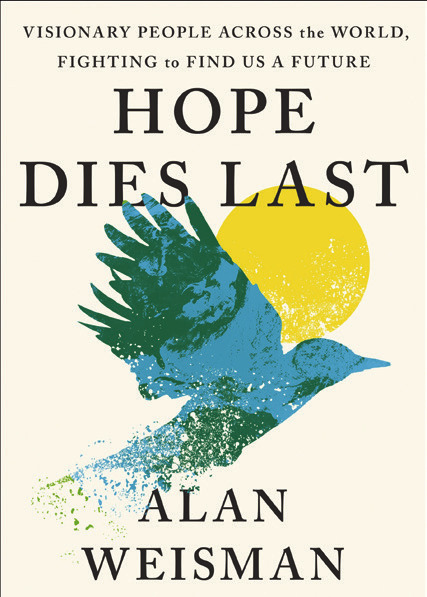Athree-minute shower. That’s just one of the things you’re doing to help the planet. You run the dishwasher once a week, hang your clothes on a rack to dry, sustainable goods go in your cart as much as possible, and you buy second-hand often. Yours is just one family, but you do your part – as do those in the new book “Hope Dies Last” by Alan Weisman.
Ever since humans learned to mold their surroundings for the sake of survival, we’ve done so. We created agriculture to replace hunting and gathering. We’ve built machines and cities to house ourselves. Over time, these things created an imbalance in nature that some believe is permanently, irreversibly set.
In this book, Weisman shows otherwise. He traveled the world to report what’s being done to ensure that humans — who admittedly didn’t create all the planet’s problems — are still thriving decades, centuries from now.
He says there are four world emergencies that need “near-miraculous” intervention.
First, the Earth’s plants and creatures, including those we don’t fully understand, must be saved. Second, we must take steps to remove at least some of the CO2 that’s in our atmosphere, or bad weather will worsen. Thirdly, we must pay attention to how our food is grown or planted so that the world’s burgeoning population can be fed without further harming the planet. And last, we need to bring that population down, which is both easy to do and difficult.
Already, though, scientists and activists are trying to get on top of these issues.
Weisman writes about an engineer born near the Persian Gulf, who hopes to reverse the damage Saddam Hussein did to ancient marshland. Chemists and geneticists are studying ways to grow food with airborne particles. Ast ronomers, Native American activists, farmers and residents of the only COVID-free island in the world are doing their parts.
Says Weisman, the hope is that they will succeed, thus allowing humanity to continue to thrive.
Did you ever totally miss that something had disappeared? It was so familiar to you, so always there that someone had to point out that it was gone? That’s the feeling you get when you read “Hope Dies Last.” The call for open eyes and action is here.
And yet, it’s going to take the most determined, most open-minded reader to fully appreciate this book. Author Alan Weisman takes us around the world to show us the work that’s mostly hidden to combat problems we know too well — and from Page One, it’s a thinking-person’s journey, filled with science, history and world culture. That’s not to deter you; it’s to alert you to the pace you’ll need here to fully grasp what you’ll read, and the broad-mindedness you’ll want to have.
So go into this book ready to learn and be amazed, but go slow. You’ll be delighted by small things, awed by big ones, and you might be spurred to act, once you’ve read “Hope Dies Last.” Just remember that even getting into it will take a minute.
— The Bookworm Sez


